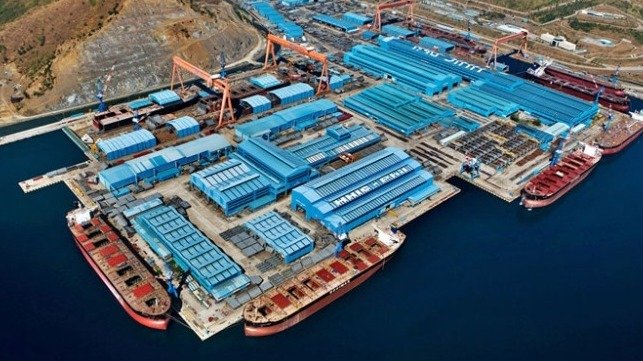THE shipyard of bankrupt Hanjin Heavy Industries and Construction Philippines in Subic applied for rehabilitation on January 8, 2019 but its fate was further sealed when the pandemic including its strict quarantine restrictions hit the country in 2020.
Once the coronavirus struck, the shipyard ---once touted as among the 10th largest in the world that brought the Philippine status as 5th largest shipbuilder was sealed-despite offers in 2019 from Perth-based shipbuilder Austal Ltd. and its partner US private equity firm Cerberus Capital Management.
As it is, China is among the most interested observers and players, the reason being it cannot risk having the shipyard operated by other countries -- except its two state-supported bidders.
For obvious reasons that Subic is strategically located near the man-made islands China built from within the West Philippine Sea, which the International Arbitral Tribunal has earlier ruled within the Philippine 200-mile exclusive economic zone.
Hanjin, a shipbuilding unit of South Korean firm Hanjin Heavy Industries and Construction, declared bankruptcy in January after defaulting on loans of over $400 million from Philippine banks, the largest default.
Subic Bay is an area around the size of Singapore. It was previously operated by the navies of Spain and the United States, and was one of the world’s largest US naval facilities
But HHIC-Phil, established in 2006, sank into financial distress due to an industry practice of delayed payments by clients, which depleted the company's cash flow, according to a Jan. 14 court order announcing the start of corporate rehabilitation.
Military officials are fearful of a Chinese presence in the area following Beijing’s aggressive behavior in the neighboring South China Sea.
Two Chinese firms have expressed interest in taking over the shipyard, prompting swift action from Manila officials who are wary of the idea as Beijing continues to flex its muscles in the South China Sea.
CIA-backed?
Brad Thompson of the Australian Financial Review wrote that Cerberus co-founder Stephen Feinberg was a major donor to former US president Donald Trump and a member of his Intelligence Advisory Board (in short linked to the US Central Intelligence Agency).
Thompson wrote that Austal is a trusted shipbuilder for the US Navy from its operations in Mobile, Alabama where it has built aluminum-hulled littoral combat ships and expeditionary fast transport vessels. The Pentagon has also pumped $S50 million into an Austal expansion that will allow it to build steel-hulled warships.
Cerberus controls $53 billion ($68 billion) in assets. Managing director Louis Bremer is a former Navy SEAL who led Bain Capital’s aerospace, defense and government services investment arm before joining Cerberus. He was also Trump’s pick for the top civilian role in oversight of special operations.
Austal is also the frontrunner to build six new offshore patrol boats for the Philippines, where it already has a substantial shipbuilding footprint. Last May, Australian Ambassador to the Philippines Steven Robinson said the deal to buy the Hanjin shipyard could be finalized in the next two months.
The Subic shipyard was owned by HHICP, a subsidiary of Korean Hanjin Heavy Industries located within the Redondo Peninsula in sitio Agusuhin. It has a deepwater port for submarines that Americans used for the Seventh Fleet when it was still a US Naval base. The Hanjin Subic Shipyard covers an area of 300 hectares (740 acres) within the Subic Freeport Zone. As of 2015, it has a 500 m × 135 m (1,640 ft × 443 ft) dock, gantry cranes and an automated assembly lines with 600,000 deadweight tonnage (DWT) of annual shipbuilding capacity.
After losing a 2016 court case that invalidated China’s claim over the contested seas, Beijing continued to administer islands, which President Duterte hasn’t publicly questioned Chinese President Xi Jinping on.
Duterte is making geopolitical concessions in the international waterway in exchange for promised Chinese capital which never materialized.
It is also said that when negotiations for the shipyard began in 2019, China tried to stop the Philippines from entertaining any offers. (To be continued)

